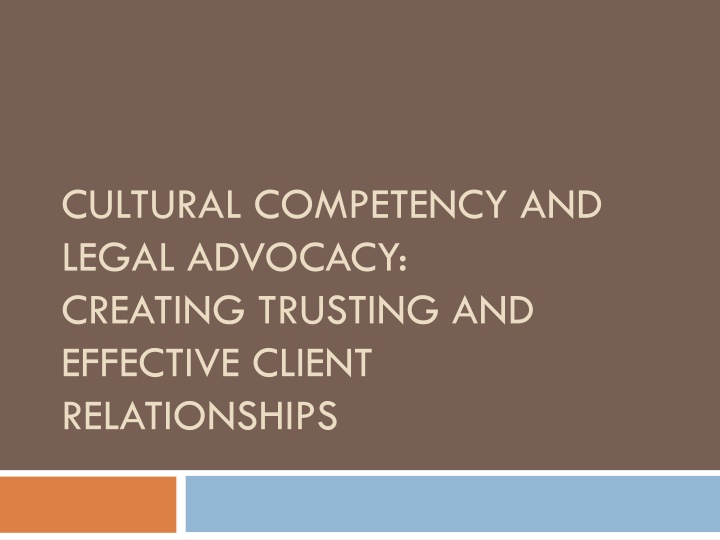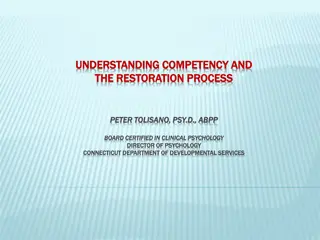Cultural Competency and Legal Advocacy: Building Trusting Client Relationships
Understanding cultural competency is essential in legal advocacy to provide effective and trusting client relationships. Cultural competence involves equal access and non-discriminatory practices, enabling communication and intervention for clients from diverse backgrounds. The importance of cultural competency is highlighted by the changing population demographics and the need to uphold professional conduct rules. Building trust with clients and providing competent representation are key facets in legal practice in an increasingly diverse society.
Download Presentation

Please find below an Image/Link to download the presentation.
The content on the website is provided AS IS for your information and personal use only. It may not be sold, licensed, or shared on other websites without obtaining consent from the author.If you encounter any issues during the download, it is possible that the publisher has removed the file from their server.
You are allowed to download the files provided on this website for personal or commercial use, subject to the condition that they are used lawfully. All files are the property of their respective owners.
The content on the website is provided AS IS for your information and personal use only. It may not be sold, licensed, or shared on other websites without obtaining consent from the author.
E N D
Presentation Transcript
CULTURAL COMPETENCY AND LEGAL ADVOCACY: CREATING TRUSTING AND EFFECTIVE CLIENT RELATIONSHIPS
Nicole F. Seawright, JD Staff Attorney CT Legal Rights Project, Inc. Middletown, CT nseawright@clrp.org Image result for CT Legal Rights Project
Road Map What is Cultural Competency? Why is understanding culture important in legal advocacy? Image result for road map Action plan for providing culturally competent services.
What is Culture? Culture is like the air we breathe it is largely invisible and yet we are dependent on it for our very being. Culture is the logic by which we give order to the world. Raymond Carroll, Cultural Misunderstandings: The French- American Experience 2 (1988)
Cultural Competence Cultural competence embraces the principles of equal access and non-discriminatory practices in service delivery. -National Center for Cultural Competence (NCCC), An ability to communicate, interact, negotiate, and intervene on behalf of clients from diverse backgrounds.
Why does cultural competency matter? Changing population. ABA Model Rules of Professional Conduct. Building trust with clients.
Why does cultural competency matter? The U.S. population has become increasingly ethnically, linguistically, and culturally diverse. Image result for globalization
Why does cultural competency matter? The ABA s Model Rule 1.1 Competence Image result for aba rule a lawyer shall provide competent representation to a client. Competent representation requires the legal knowledge, skill, thoroughness and preparation reasonably necessary for the representation.
Why does cultural competency matter? Building Trust How do you know when a lawyer is lying? . . . Their lips are moving.
Client-Centered Lawyering Client as architect for their own future. Image result for architect
Action Plan Examine self: Explore implicit bias. Related image Increase knowledge of other cultures. Acquire cross-cultural communication skills.
Examine Self- Implicit Bias Implicit bias is the unintentional or unaware act of grouping persons or things into categories that can lead to discriminatory behaviors.
Increase Knowledge A little bit of research and understanding can go a long way.
Acquire Cross-cultural Communication Skills Communication: Active listening. Assessing client s body language. Asking questions to understand the client s needs.
Final Thoughts Cultural competence is a developmental process. Intersectionality is real. Difficult discussions are worth having.
Resources National Center for Cultural Competence https://nccc.georgetown.edu/ Harvard Implicit Association Test https://implicit.harvard.edu/implicit/ American Bar Association https://www.americanbar.org Pro Bono Net https://www.probono.net/
Questions? Opportunity for discussion.























